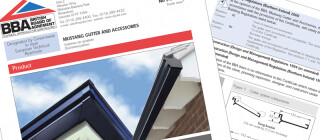Of the many issues that have emerged since the Grenfell Tower fire of June 2017, one of the most complex and troublesome is the way in which buildings products and systems are selected.
It has emerged that various products used in the 2016 refurbishment of the London tower block were either not suitable for the application or not used correctly. The cladding not only caught fire but acted as both an accelerator and a wind tunnel to escalate the spread of the flames. It was an horrific lesson in the importance of product specification.
Manufacturers are wont to make all kinds of claims for the products that they sell (and not just in the construction industry). We can only trust those claims if there is a regime in place to keep any excess hyperbole in check. The Advertising Standards Authority, for example, prevents manufacturers telling us that their products will make us sexually irresistible. They are only allowed to imply it.
This article was first published in the March 2021 issue of The Construction Index magazine. Sign up online.
Underpinning the safety regime of building products is a system of independent third-party certification. This is not a legal requirement but specifiers expect to see a recognised quality mark on building products that verifies the claims of manufacturers. The leading certification body in the UK is the British Board of Agrément (BBA). Agrément – the French word for agreement – is the process by which BBA provides independent third-party confirmation of manufacturers’ product performance claims.
The BBA exists to keep the manufacturers honest. A BBA badge on a product means that the manufacturer’s claims have been independently tested and verified as correct.
Or at least that is what we have always supposed. The Grenfell Tower fire has thrown into doubt the whole credibility of third-party certification.
The official inquiry into the fire heard last autumn how Arconic, the manufacturer of the lethal cladding panels, had persuaded BBA to treat the riveted and cassette versions of its cladding system as different fixing systems rather than totally separate products. An expert witness, chartered fire engineer Dr Barbara Lane, described Arconic’s BBA certificate as “factually incorrect” when it stated that the panels in question were ‘Class 0’, the minimum requirement for external surfaces of buildings.
Sam Stein QC, acting for the bereaved and survivors of the fire, said: “We suggest that the BBA as an organisation was beset by fundamental issues. Those issues compromised its ability to discharge its safety-critical function. Those issues included a lack of independence arising from a fear of losing business, competing commercial interests, and a drive for cost efficiency over accuracy.”
Because of the issues emerging from the ongoing inquiry, the government announced in January the formation of a new regulatory body to oversee the safety of construction materials. The construction products regulator will be a division of the Office for Product Safety & Standards within the Department for Business, Energy & Industrial Strategy and have an initial £10m to get going.
This article was first published in the March 2021 issue of The Construction Index magazine. Sign up online.
This new tier of bureaucracy has been deemed necessary specifically because of the failure of the construction industry to regulate itself, as proven by the nationwide cladding scandal exposed by Grenfell.
Housing secretary Robert Jenrick said: “The Grenfell Inquiry has heard deeply disturbing allegations of malpractice by some construction product manufacturers and their employees, and of the weaknesses of the present product testing regime. We are establishing a national regulator to address these concerns and a review into testing to ensure our national approach is fit for purpose.”
Even before the whole Grenfell issue shone a light on the certification system, the BBA was not universally well-regarded by its customers. While end-users believed in the power of the badge – believed that BBA certification meant something real – manufacturers were not all so convinced by the whole process.
In general, manufacturers are reluctant to bad-mouth the BBA publicly for fear of it counting against them when getting new products certified or existing certificates re-audited. But there does not seem to be a lot of love out there. One manufacturer that spends thousands of pounds a year with the BBA does not believe much actual testing takes place at all.
The manufacturer’s technical manager says: “We do mechanical testing in-house and then externally using independent testing houses. I don’t believe that BBA do any further tests, even though they charge us for it. They just check our paperwork.”
He continues: “They spent 18 months considering one of our applications and charged us £30,000. We gave them pages and pages on 30 different tests for all different chemical formulas.” He got his BBA certificate in the end but could get no information on the BBA’s own test results.
“There is a very strong dislike of BBA within our world,” he says. “No one thinks the certificates are worth anything but no one will openly discuss it because if you don’t get your BBA certificate your business goes somewhere else. There is a fear that if you speak out you might get your certificates frozen or removed.”
This could just be someone complaining about bureaucracy and the hoops they have to jump through. But the issue could be deeper. “I know that there are products on the market that do not meet the requirements of relevant British Standards but do have a BBA certificate. I know because I make it my business to test our competitors’ products. And the industry knows. Installers know what does and doesn’t work.”
And here’s what the managing director of another BBA customer thinks: “They are the most unaccountable, expensive, bureaucratic organisation we deal with – and that is really saying something. They damage the construction industry by their slowness. Launching something new with potential user benefits is always delayed unnecessarily by their inability to do anything in under two years. When the technical work (evaluating & testing) is done, the results seem to disappear into a black hole where nobody knows where they are or when the certificate will be issued. At no point have they ever given acceptable customer service.”
It was against this backdrop of damaged credibility and an unhappy customer base that Hardy Giesler joined the BBA as chief executive in January 2020. One of his first actions was to do a tour of the country, meeting and talking to customers.

“I became very aware that the performance we were delivering to our clients, and to the industry, was not good enough and our clients echoed that view,” he told the Re:Construction podcast on 10th February this year (Episode 49).
“The overwhelming concern was that it was not a good experience to deal with the BBA. It is technically strong but the actual interface, the communications, and sticking to a delivery programme, these were issues people struggled with and this is what we are coming to address.”

“A good starting point is probably to say that I am not happy with anything in the BBA until we have proven that our clients respect what we do, see the value in what we do, and see that it is value for money. We are leaving no stone unturned. We are looking at every aspect of our performance. We have been through some tough times and I think it is only fair that everything is reviewed and looked at in detail.”
There is a lot going on at the moment, said Giesler. “There have been significant people changes within the organisation. There have been wholesale changes at board level and at senior management level.”
He continued: “We are trying to do three things. One is we want the BBA to be relevant in the construction industry. We have a lot of information but do we make it accessible? Do we make it easy to interpret and to understand so that people will get value from that?
“The second one is to make the BBA a client- and a market-focused organisation.
“The third one is to be systems-driven. Part of the issue we have had with people not having great experience with the BBA is that we weren’t as strong on systems within the business. We all make mistakes and forget to follow up but if there isn’t a system to remind us then things can fall by the wayside, and we can’t afford that to happen.”
As a former board member of Tarmac Building Products and managing director of Tarmac Topblock, Giesler understands what matters to the industry.
“The certification process comes at the back end of quite a lengthy and expensive product development phase for construction product manufacturers and often the certification stands between them having spent a lot of money and recovering that money through coming to market and launching a product,”
he said.
“These are big-ticket items for our clients and we need to respect that. We need to understand that although our process may take a while to complete, some of our tests can run for 10 or 11 months, and we need to make sure that our clients understand that up-front and plan that into their process. And we must keep them up to date as we go along so they know we are [doing] what we said we were doing,” he added.
“We have redesigned our whole delivery process end-to-end,” explained Giesler. “We are currently digitising that into a new IT system. Once that is up and running we will introduce a client portal where, instead of having to email or phone to chase the person responsible, clients can go into the client portal and see the status of their job.”
All of this should help to address customer dissatisfaction, says Giesler. But then there is the whole Grenfell agenda.
“I think we have seen from the testimony given at the Grenfell Tower inquiry last year that the process isn’t foolproof,” he acknowledged. “If people really want to step outside of the process there is probably going to be the opportunity to do so. For that reason we have launched a consultation on a new product called Agrément Plus, which will run alongside the Agrément process.
“Agrément Plus is focused on the high-risk [high-rise] residential buildings, typically 10 storeys or higher,” he explained. “We know that, from a strength and from a fire perspective, and some other performance elements, that those buildings present a particular challenge to construction products. Therefore we believe that a higher standard for certification needs to be achieved for products used in those environments.”
Not only will the testing be more rigorous, with the addition of chemical analysis of components and ingredients, but it is also likely to be costlier, Giesler acknowledged, due to the additional work involved. For this reason, he is seeking support from BBA customers – the manufacturers that pay to have their building products certified.
Asked whether Agrément Plus might be extended to other equally safety-critical but less topical applications, such as in ATEX explosion-proof environments or sealing landfill sites to contain methane, he said that was something to be considered later.
“We may extend it beyond high-risk residential buildings but this is the starting point for us because it is the most critical aspect of performance, as far as construction products are concerned, that needs to be addressed,” Griesler said.
“What we have seen happen in Grenfell has been a wake-up call for the industry and we would all like to do more.”
This article was first published in the March 2021 issue of The Construction Index magazine. Sign up online.
Got a story? Email news@theconstructionindex.co.uk



